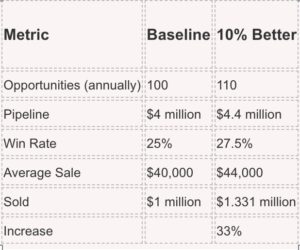- July 9, 2024
- Posted by: Dave Kurlan
- Categories: Uncategorized, Understanding the Sales Force

A friend just texted me from his Las Vegas hotel room and sent along a video of him and his son playing catch with their gloves and a baseball in their hotel room.
I told him to be careful because breakage is expensive in Las Vegas and he said that’s why they do it – to be precise. His son is a friend of my son’s, was on the same baseball showcase team in high school, and they have played on the same summer collegiate league team the past two summers.
My son ALWAYS wanted to practice. “Dad, can we hit?” “Dad can I pitch to you?” “Dad can you throw me pitches to block?” And while we never tried it with anything other than Nerf balls in hotel rooms and in the house, we played catch with small footballs in resort pools everywhere we traveled. Example: Picture above is from 2019 when we drove eight hours so my son could practice with and get coached by former Orioles, Rays, and Astros Outfielder/Designated Hitter Luke Scott who averaged 25 home runs over a nine-year Major League Baseball career.
When I was young and playing baseball, I practiced every minute I could. When I was in high school and playing tennis I literally lived on the tennis courts and was there from 6am until 10pm every single day. One of my regrets is that I didn’t practice more when I was a trumpet player. I was good – but not as good as I could have been.
Pivot to sales.
If the most committed baseball players always want to practice, and the same would be true for all athletes including soccer (I put it first instead of not including it), football, hockey, golf, track, and basketball, why isn’t it true for sales?
[Post and video with more on practice excellence in sales]According to data from more than 2.5 million salespeople assessed by Objective Management Group (OMG), only 72% of all salespeople are committed to their sales success and if we look at the largest population – the weakest 50% – only a little more than half of that group are committed. Why would they practice?
That leaves 46% of the weakest half who are committed plus all of the top 10%, nearly all of the next 15%, and 78% of the middle 30%. Are they as committed to sales as the data suggests? Probably. But for most of them, not committed enough to practice.
But what would practicing accomplish? How about these ten outcomes which lead to increases in sales?
- Perfecting their messaging
- Tweaking how they sound including their pace, volume, pitch and intonation
- Improving how they handle resistance, negativity, disinterest and put-offs
- Practicing enough so as not to become emotional
- Becoming masterful at discovery, especially listening and asking questions
- Developing how they can be the value and bring value to every conversation
- Working on their ability to thoroughly qualify every opportunity
- Delivering compelling presentations to groups
- Their ability to position themselves and differentiate their company from every competitor
- Improve their ability to understand what’s important to their audience and discuss it like an expert
If every salesperson became just 10% better at everything they did, that would result in 10% more meetings, 10% more value in the pipeline, 10% higher win rate, 10% higher average sale, which all translates to a 33% increase in sales. Don’t believe me? Do the math!

So if practicing could make every salesperson just 10% better, it would result in a 33% increase in sales, a 33% or more (with kickers) increase in commissions, and required only 20-30 minutes per day, why don’t more salespeople practice?
Here are five easy answers:
- They don’t know what good sounds like so it’s hard to practice it if they don’t know what to reproduce. Lack of sales training.
- Sales Managers aren’t asking them to, requiring it, or leading them through it because they too don’t know what good sounds like. Lack of sales management training.
- Most Sales Managers don’t push, coach or drive their salespeople. Instead, they defend their salespeople and this would require more time. Lack of leadership.
- They are paid well and don’t understand why they should do more and lack the incentive to do more. They’re complacent.
- They don’t have anyone they trust enough to be their role playing partner. Lack of a sales culture.
Practicing for everything that can happen in sales, especially the things people don’t handle well, doing it often and everywhere, and being precise about it will lead to an increase sales of 33%. Why would anyone not care enough about that to practice?
Image copyright Dave Kurlan.
